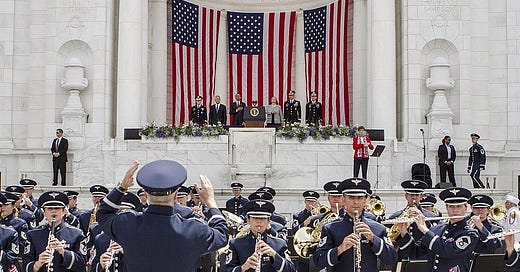Memorial Day Celebration, Wikimedia Commons
Wishing you a memorable and meaningful Memorial Day!
On this day, at countless commemorative services nationwide and on the National Mall in Washington, DC, people will gather with the National Symphony Orchestra, military bands, and other ensembles to sing “America the Beautiful.”
It’s hard to sing this song, sometimes referred to as America’s second national anthem, and not feel connected to Americans, both past and present, engaged in an ongoing, sacred saga. If that sounds like American exceptionalism, the anthem provides a humble version of that claim, defining the nation not as being better or more powerful than others but, instead, especially blessed. It also recognizes that all graces come with obligations.
Along with appreciating the anthem’s beauty, I cherish its sense of thanksgiving and aspiration. Thanksgiving for our heroes who more than self their country loved. For those who loved mercy more than life. For the pilgrims who beat a thoroughfare for freedom. Thanksgiving to a God who shed His grace on you and me.
Aspiration that we can refine our gift of gold till all success be nobleness and every gain divine. That God will help us mend…every flaw [and] confirm…liberty in law.
I don’t know about you, but when I hear the call to crown thy good with brotherhood from sea to shining sea, I don’t think of brotherhood as stopping at the shores or borders, any more than the dignity of every person does. Nor does the Declaration of Independence state that only those living in the United States are endowed by God with certain unalienable rights such as life, liberty, and the pursuit of happiness.
Perhaps this Memorial Day, we should view our singing of this anthem not as a mere sentimental statement but as a vow for how we will act in the days ahead. Like our gathering, let us regard singing the song together as a special call to unity in a nation increasingly divided by efforts at cancellation, retribution, name-calling, and defining those who disagree with us as “others” undeserving of basic human respect.
Years ago, after my first wife died, I spoke with a now-deceased counselor, Joan Hickey, about what makes a relationship between two people strong enough to maintain a deep commitment to one another. In her experience, she said, the bond usually comes from collaborating on shared projects or purposes, such as raising children, supporting a cause, or engaging in common intellectual pursuits. I believe the same applies to how we bond as people within this nation—in what we do for all our children, how we engage in a common effort to build a vibrant democracy, and how we treasure honesty and faithfulness in our relationship.
My getting more from you or putting you down, and vice-versa, is not a mutual commitment to a common national cause.
Perhaps you think this anthem merely reflects a dream world. On one level, you might be right. However, the song celebrates a beautiful patriotic dream that sees beyond the years. Consider how limited the short-term alternative dream is: acquiring something for myself in the near term, using policy mainly to attack or take from others, and viewing such give-and-take as a zero-sum or negative-sum game, much like how warriors in ancient times often perceived their conflicts. Try to fit that alternative dream into some shared national anthem.
In her original version of the anthem, Katherine Lee Bates did not, as might be interpreted in the modern version, make the phrase, God shed His grace on thee, into a third-person declarative statement about God’s past or current beneficial actions on our behalf. Instead, it was a second-person appeal to God to continue providing grace as we strive TILL souls wax fair as earth and air in one verse, and TILL selfish gain no longer stains the banner of the free in another. She didn’t claim we were there yet!
Some make a similar mistake in interpreting John Winthrop’s sermon, “A Model of Christian Charity,” delivered in 1630 to the Puritans on the ship Arabella. For we must consider that we SHALL BE as a city upon a hill is an appeal to his fellow passengers about the work required to build something holy and new, not a declarative statement of what type of city or people they were.
Today, we celebrate the heroes who sacrificed for us and our neighbors around the world. Whatever mistakes our government has made along the way, these heroes helped usher in a modern era marked by unprecedented advances in poverty reduction and, at least until recently, freedom. If we, in our turn, can’t pledge to sacrifice and work together, then perhaps we have no right to sing “America the Beautiful.”






Beautiful, Gene. I’m so grateful for all your commentary. My favorite economist and one of the best souls I’ve ever met. You bring a better America into being — economically, politically, socially.
Beautiful take, Gene. Both on "America, the Beautiful" and your personal story. If I have time, I may take a cue from you and do a brief Memorial Day piece on the song as well. I've been meaning to do so, based around a wonderful 2008 discussion of the song on NPR. It's really about musicology--why the patterns of the music are so impactful, but along the way, you learn why the words and the melody combine to have such emotional impact. It's a 10-minute listen, but well worth it. https://www.npr.org/2008/11/04/92198269/the-power-behind-america-the-beautiful